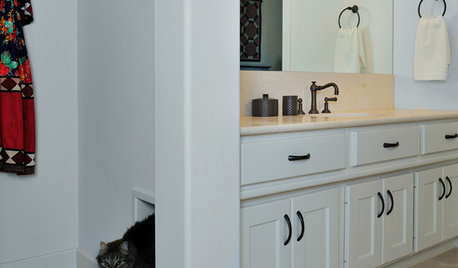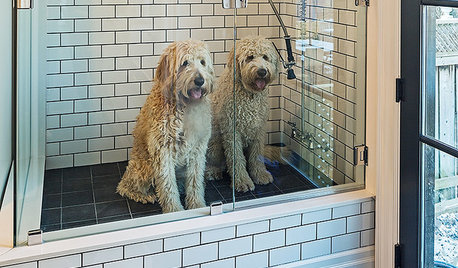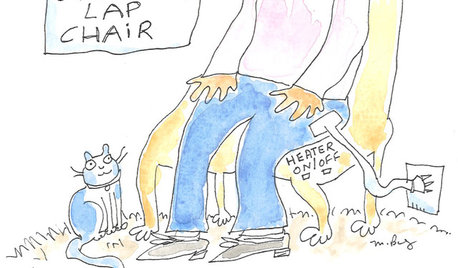17-year-old cat with kidney failure
harriethomeowner
16 years ago
Featured Answer
Sort by:Oldest
Comments (74)
harriethomeowner
16 years agolast modified: 9 years agolaurief_gw
16 years agolast modified: 9 years agoRelated Discussions
3 Year Old Cat Female Cat Marking_What to do-long
Comments (28)I see there is interest in this so I'll link to my animal communicator's website. The communicator, Gayle Nastazi, has always been very helpful to me. I have used her services with many of my cats in various situations; from dire emergencies (missing animal- found after 3 weeks!), to behavioral issues, to intergration and rescue issues with feral and abandonned cats that come into my care. I always learn something from every session. Although I know the whole idea strikes some people as pretty far-fetched (and that's OK), I feel comfortable saying that it has worked very effectively for me, and that I think it makes resolution of some difficult issues much easier. One thing I can say for certain is that Gayle is completely legitimate. I have met her in person. I also have no financial interest in this referral - just a hope that my suggestion might be useful. Click on the clink below and look for the Animal Communication link at the top left of the page. Carry on from there if you are interested. RE: Various Animal pee cleaners/destinkes - I think many (most?) employ some kind of enzyme. My conclusion after using all of them is that after the bottles are opened and partly used that it's possible that exposure to air in the emptying bottle degrades the enzyme significantly. It always seems to me that they work like gangbusters at first and then less so, particularly if not used up in a short time. Then I try another brand and it seems to work better (even tested side by side), but eventually poops out, too. I have tried Odor-X, Nature's Miracle and Get Serious, along with scads of others. The pattern seems to hold for all, so now I only buy in quarts not gallons, even though it's 'way cheaper in big jugs. I haven't experimented with decanting a gallon into smaller jars and keeping them closed until I've used up the other portions. Also I find it's helpful to vigorously shake the plastic bottle before applying. The idea mentioned by olychik about using rags is v. interesting and I will keep it mind. I hope that my link may be useful to you. Here is a link that might be useful: Link to Gayle Nastazi, Animal Communicator's webpage...See MoreTender Vittles...Kidney Failure-Weight Loss
Comments (24)Laurie, we have not tried cyproheptadine with her as of yet. It is RX, right? She's gained or maintained her weight adequately over the 3 years, but she has short episodes where she doesn't eat well from time to time. She's having more problems since her brother passed away, but that was still less than a month ago. I've been using nutrical on her, which seems to work a bit like an appetite stimulant, or it settles her stomach enough to make her feel like eating. One of the biggest problems we are having of late is that she often wants to eat her dry food and not the wet we put out. Since she had her teeth pulled last fall, she just swallows the kibble pieces whole (she doesn't like them moistened or broken up though). When the dry kibble expands in her stomach, it is apparently too much for her and she throws it up. Almost worse than that, her new MO is to climb up on the bed at night when she is feeling sick and allbut throw up next to our heads. We wake up to her doing the nauseas, watery-mouth thing. She has thrown up a lot in her life with all her health problems, but never thrown up on the bed, and definitely not practically on one of us. We are getting to the point that we are going to have to lock her out of our bedroom at night. I feel terrible, but that's just too much. She's due to go into the vet, hopefully this week, but I'm sick today so will make the appointment tomorrow or when I feel well enough, and I'll talk to the vet about these things. I probably should have started a new thread for this, but gosh, she's really frustrating me lately. I feel bad and know that it's probably triggered by grief, but it gets to a point that she's driving me crazy too....See MoreUpdate on 17-year-old cat
Comments (24)Kitty still seems to be comfortable and content, though withdrawn in comparison with his healthy behavior. I am so torn about whether to give him anything. He's drinking what looks to be a normal amount of water a few times per day, and he doesn't seem to be in pain. He's using his litter box to urinate (a couple of times a day, normal amount) and is able to get up and down the stairs to the basement. I was wondering if I should give him the liquid vitamins, at least. OTOH, the vet said not to bother -- just let him do what he wants. The vet said the ultrasound gives 99.9% certainty that kitty has a malignant tumor, so there's probably not much that can be done. We feel that when an animal so strongly rejects food that it's cruel to force him to eat. He's never been a super-cuddly cat, but he has always made it known when he wants a lap. He purred and acted happy when I picked him up and cuddled him yesterday and then held him in my lap....See More17 year old cat facing eye removal
Comments (26)dallas, My cat has an eye that looks different and also a spot, but I know her history. She was found as a 7 week old stray in poor health. One of her eyes had suffered a puncture retina and the specialist at the time said an option is to remove the eye since the cat was at a higher risk for a tumor. I chose the wait and see. She's now nearly 9 yrs old and has regained sight in that eye. It also looks pretty normal except it squints a little more than the uninjured eye. We just keep an eye on her and have the eye checked every 1-2 years. Letting nature take its course can end up being very uncomfortable and painful for a cat that may otherwise need treatment. Animals don't show pain and discomfort in ways that we would expect and sometimes the signs are so subtle owners miss them altogether. IMO, pet owners worry too much about putting an animal thru surgery, especially since use of anesthesia and surgery itself has improved so much over the years. If my cat started to show signs of possible tumor/cancer I wouldn't hesitate to have the eye removed. The steps arlosmom took in working with her vet and the specialist are worth following. Hopefully, there will be no change when your cat's eye is rechecked and you won't have to worry about further treatment....See Morequasifish
16 years agolast modified: 9 years agoharriethomeowner
16 years agolast modified: 9 years agolaurief_gw
16 years agolast modified: 9 years agoElly_NJ
16 years agolast modified: 9 years agoharriethomeowner
16 years agolast modified: 9 years agolaurief_gw
16 years agolast modified: 9 years agoharriethomeowner
16 years agolast modified: 9 years agolaurief_gw
16 years agolast modified: 9 years agosylviatexas1
16 years agolast modified: 9 years agoharriethomeowner
16 years agolast modified: 9 years agolfnyc
16 years agolast modified: 9 years agolaurief_gw
16 years agolast modified: 9 years agoharriethomeowner
16 years agolast modified: 9 years agoharriethomeowner
16 years agolast modified: 9 years agosylviatexas1
16 years agolast modified: 9 years agoharriethomeowner
16 years agolast modified: 9 years agolaurief_gw
16 years agolast modified: 9 years agoharriethomeowner
16 years agolast modified: 9 years agolaurief_gw
16 years agolast modified: 9 years agoharriethomeowner
16 years agolast modified: 9 years agolaurief_gw
16 years agolast modified: 9 years agoharriethomeowner
16 years agolast modified: 9 years agolaurief_gw
16 years agolast modified: 9 years agotess_5b
16 years agolast modified: 9 years agoharriethomeowner
16 years agolast modified: 9 years agolaurief_gw
16 years agolast modified: 9 years agoElly_NJ
16 years agolast modified: 9 years agosylviatexas1
16 years agolast modified: 9 years agoharriethomeowner
16 years agolast modified: 9 years agoquasifish
16 years agolast modified: 9 years agoharriethomeowner
16 years agolast modified: 9 years agocynthia_gw
16 years agolast modified: 9 years agoLily316
16 years agolast modified: 9 years agolfnyc
16 years agolast modified: 9 years agotess_5b
16 years agolast modified: 9 years agocynthia_gw
16 years agolast modified: 9 years agojjsmith1968
16 years agolast modified: 9 years agolfnyc
16 years agolast modified: 9 years agolaurief_gw
16 years agolast modified: 9 years agorunsnwalken
16 years agolast modified: 9 years agorunsnwalken
15 years agolast modified: 9 years agolioness616
15 years agolast modified: 9 years agorunsnwalken
15 years agolast modified: 9 years agolioness616
15 years agolast modified: 9 years agoladydicats
15 years agolast modified: 9 years agolioness616
15 years agolast modified: 9 years agolaurief_gw
15 years agolast modified: 9 years agoladydicats
15 years agolast modified: 9 years ago
Related Stories

PETSSo You Want to Get a Cat
If you're a cat lover, the joys outweigh any other issue. If you haven't lived with one yet, here are a few things to know
Full Story
FALL GARDENINGReflecting on a Gardening Year
Mistakes and successes, surprises and comforts. The garden helps us grow in new ways every year
Full Story
SMALL SPACESLife Lessons From 10 Years of Living in 84 Square Feet
Dee Williams was looking for a richer life. She found it by moving into a very tiny house
Full Story
THE HARDWORKING HOME8 Laundry Room Ideas to Watch For This Year
The Hardworking Home: A look at the most popular laundry photos in 2014 hints that dog beds, drying racks and stackable units will be key
Full Story
GARDENING GUIDES8 New Ways to Garden This Year
A successful garden means knowing the plants, the wildlife and yourself
Full Story
HOUZZ TOURSMy Houzz: Old-World European Flair in Oregon
Custom woodwork, stained glass and Arts and Crafts touches create warm, earthy interiors in a ranch-style home
Full Story
PETS10 Tips for Keeping Indoor Cats Healthy and Happy
It's National Cat Day: Ask not what your cat can do for you (because it will ignore you) but what you can do for your cat
Full Story
PETSHouzz Call: Send in the Design Cats
Post your best photo of your cat at home, in the garden or with you in your studio. It could be published in a featured ideabook
Full Story
PETSHouzz Pets Survey: Who Rules the House — Dogs or Cats?
New data shows that pets make people happy, and pet owners love spending big to return the favor
Full Story
FUN HOUZZIf Cats Could Design
Ever wonder what your cat might dream up as an architect or interior designer? Here's a peek
Full Story





laurief_gw